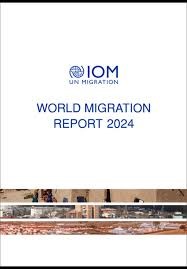Free Courses Sale ends Soon, Get It Now


Free Courses Sale ends Soon, Get It Now



Disclaimer: Copyright infringement is not intended.
Context:
Findings :
|
●Storm Daniel, also known as Cyclone Daniel, was the deadliest Mediterranean tropical-like cyclone in recorded history, as well as one of the costliest tropical cyclones on record outside of the North Atlantic Ocean, forming as a low-pressure systems around 4 September 2023. |
Migration as driver for growth:
Displacement crisis:
Climate change as driver:
Causes of displacement :
Adaptation tool against climate change:
No continent unaffected
About The World Migration Report 2024:
|
International Maritime Organization (IMO): ●Establishment: The IMO is a specialized agency of the United Nations responsible for regulating shipping on a global scale. It was established in 1948 and became operational in 1959. ●Mandate: The primary mandate of the IMO is to promote maritime safety, security, and environmental protection in the international shipping industry. ●Regulatory Framework: The IMO develops and maintains a comprehensive regulatory framework for shipping, including conventions, protocols, guidelines, and codes of practice. These regulations cover various aspects such as vessel construction, navigation, crew training, pollution prevention, and maritime security. ●Safety of Life at Sea (SOLAS): The IMO's most important convention is the International Convention for the Safety of Life at Sea (SOLAS), which sets minimum safety standards for ships, equipment, and operations. ●Marine Pollution Prevention: The IMO addresses marine pollution through conventions like the International Convention for the Prevention of Pollution from Ships (MARPOL), which regulates pollution from ships in areas such as oil spills, sewage, garbage disposal, and air emissions. ●Ship Security: The IMO's International Ship and Port Facility Security (ISPS) Code establishes measures to enhance the security of ships and port facilities against threats of terrorism and unlawful acts. |
Conclusion:
Source:
|
PRACTICE QUESTION Q.”Critically Analyze the challenges and opportunities presented by global migration trends highlighted in the report, and suggest policy measures for governments to address the complexities of contemporary migration dynamics.”(250 words) |
© 2024 iasgyan. All right reserved